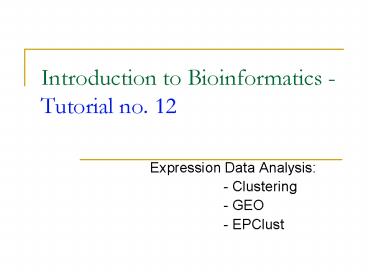Introduction to Bioinformatics - Tutorial no. 12 - PowerPoint PPT Presentation
1 / 27
Title:
Introduction to Bioinformatics - Tutorial no. 12
Description:
Introduction to Bioinformatics - Tutorial no. 12 Expression Data Analysis: - Clustering - GEO - EPClust Application of Microarrays We only know the function of about ... – PowerPoint PPT presentation
Number of Views:318
Avg rating:3.0/5.0
Title: Introduction to Bioinformatics - Tutorial no. 12
1
Introduction to Bioinformatics - Tutorial no. 12
- Expression Data Analysis
- - Clustering
- - GEO
- - EPClust
2
Application of Microarrays
- We only know the function of about 20 of the
30,000 genes in the Human Genome - Gene exploration
- Faster and better
- Applications
- Evolution
- Behavior
- Cancer Research
3
Microarray Analysis
- Unsupervised Grouping Clustering
- Pattern discovery via grouping similarly
expressed genes together - Three techniques most often used
- k-Means Clustering
- Hierarchical Clustering
- Kohonen Self Organizing Feature Maps
4
Hierarchical Agglomerative Clustering
- Michael Eisen, 1998
- Cluster (algorithm)
- TreeView (visualization)
- Hierarchical Agglomerative Clustering
- Step 1 Similarity score between all pairs of
genes - Pearson Correlation
- Euclidean distance
- Step 2 Find the two most similar genes, replace
with a node that contains the average - Builds a tree of genes
- Step 3 Repeat
5
Agglomerative Hierarchical Clustering
Need to define the distance between thenew
cluster and the other clusters. Single Linkage
distance between closest pair. Complete
Linkage distance between farthest pair. Average
Linkage average distance between all pairs
or distance between
cluster centers
Distance between joined clusters
The dendrogram induces a linear ordering of the
data points
Dendrogram
6
Results of Clustering Gene Expression
- CLUSTER is simple and easy to use
- De facto standard for microarray analysis
- Limitations
- Hierarchical clustering in general is not robust
- Genes may belong to more than one cluster
7
K-Means Clustering Algorithm
- Randomly initialize k cluster means
- Iterate
- Assign each genes to the nearest cluster mean
- Recompute cluster means
- Stop when clustering converges
- Notes
- Really fast
- Genes are partitioned into clusters
- How do we select k?
8
K-Means Algorithm
- Randomly Initialize Clusters
9
K-Means Algorithm
- Assign data points to nearest clusters
10
K-Means Algorithm
- Recalculate Clusters
11
K-Means Algorithm
- Recalculate Clusters
12
K-Means Algorithm
- Repeat
13
K-Means Algorithm
- Repeat
14
K-Means Algorithm
- Repeat until convergence
15
(No Transcript)
16
EPClust Input (1)
Expression data matrix
Extra annotation for gene rows
Method of tabulation
Name for further analysis
17
EPClust Input (2)
Method of measuring distance between gene rows
Cluster hierarchically
Number k of means
Cluster into k means
18
GEO Gene Expression Omnibus
- NCBI database for gene expression data
- Founded at end of 2000
19
(No Transcript)
20
Querying GEO
Browse records
Search for entries containing a gene
Search for experiments
Search with Entrez
21
SGD Expression database
http//db.yeastgenome.org/cgi-bin/expression/expre
ssionConnection.pl
22
SGD Expression database
23
SGD Expression database
24
SGD Expression database
25
Two labs are running experiments on the APO1
gene. Suggest a method that would allow them to
compare their results.
- Gene grouping
- Relative values
26
Explain how microarrays can be used as a basis
for diagnostic
Sample 1 Sample 2 Sample 3 sample4 Sample 5
Gen1 - -
Gen2 - -
Gen3 - -
Gen4 - -
Gen5 - - -
27
Explain how microarrays can be used as a basis
for diagnostic
Sample 1 Sample 2 sample4 Sample 3 Sample 5
Gen1 - -
Gen2 - -
Gen3 - -
Gen4 - -
Gen5 - - -































